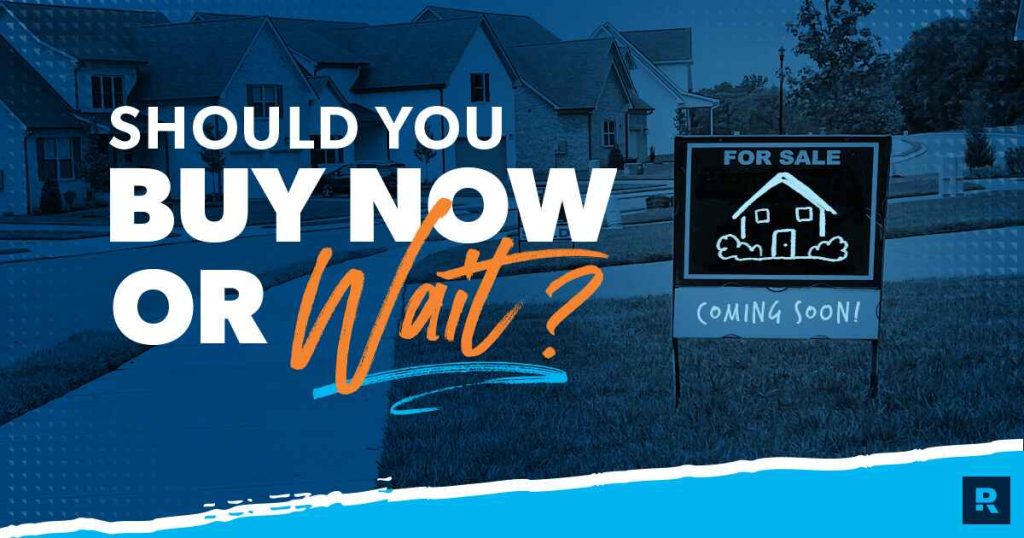Have you watched the news lately, scrolled through TikTok, or looked at X (RIP Twitter) lately? Or maybe spent time around that one friend who’s a self-proclaimed real estate expert? If so, then chances are you’ve heard that mortgage interest rates and home prices are pretty high these days—which is 100% true.
If you’ve been thinking about buying a house or working to save up a down payment, then that news has probably left you with an important question: Should I buy a house now, or wait?
To answer that question—and so you can make the best decision for you and your family—let’s look at whether now is a good time for you to buy, or whether you should punt that decision down the road.
Should I Buy a House Now or Wait?
So, should you buy a house now? Well, it depends. But don’t worry—we’re not just going to leave you hanging with a vague answer! Here’s a breakdown of when you should wait to buy a house, and when to pull the trigger.
When to Wait
You should wait to buy a house if you aren’t financially prepared for homeownership. No matter what the housing market is doing, buying a house is a bad idea if you don’t have your ducks in a row.
Specifically, you should wait on buying a house if . . .
- You have existing debt. Focus on paying off all your consumer debt before you buy a house. Getting rid of student loans, credit card payments and car notes will give you more margin in your budget—and that’s super important as a homeowner.
- You don’t have a full emergency fund. Saving up an emergency fund of 3–6 months of your typical expenses before you buy will make a broken HVAC unit, fridge or washing machine merely an inconvenience instead of a catastrophe.
- You haven’t saved a strong down payment. If you’re a first-time home buyer, you need a down payment of at least 5–10%. But if you can swing a 20% down payment, that’s even better. Why? Putting 20% down will keep you from having to pay for private mortgage insurance (PMI), an extra monthly fee that could add hundreds to your house payment.
- You can’t afford the house payment. Don’t buy a house if the monthly payment (including principal, interest, homeowners insurance and HOA fees) on a 15-year fixed-rate mortgage would be more than 25% of your take-home pay. Any more than that, and you run the risk of not having enough money left in your budget each month to put toward other important financial goals—in other words, you’ll be house poor.
We know how badly you want to be a homeowner and to start building equity. But if one or more of those statements apply to you, that’s where you should direct your focus for now. Every day, we talk to folks who bought a house before taking those steps and wound up regretting it because they got stuck with a giant, expensive burden.
We want your home to be a blessing.
When to Buy
If you have checked all those boxes, then you’re ready to hire a real estate agent and get to buying! You may be tempted to wait around for a better interest rate or more affordable home prices, but that’s not a good idea for a couple of reasons.
Dave Ramsey recommends one mortgage company. This one!
For starters, house prices will start going up as interest rates continue to drop. Lots of folks haven’t been able to afford a house because of high interest rates, so they’ve been sitting and waiting. As rates keep getting lower, more and more of those people will start buying homes—and sellers will be able to raise their prices because of that increase in demand.
Plus, if you buy now and interest rates continue dropping over the next year or two, you can still take advantage of the lower rates by refinancing your mortgage. On the other hand, if you wait to buy and home prices go up, you’re stuck with the higher prices. Think of it this way: You date the interest rate, but marry the house.
Overall, you never want to decide whether to buy a house purely based on what the market is doing. If you’re in good shape with your money, there’s no reason to wait.
Will Mortgage Rates Keep Going Down in 2025?
Yes, mortgage rates should continue going down in 2025. Because the Federal Reserve (also known as the Fed) recently lowered the federal funds rate, which influences mortgage rates across the country.
In September 2024, the Fed lowered the federal funds rate for the first time in four years—and they cut it again in November.1,2 While it’s unclear if the Fed will make any more cuts before the end of the year, mortgage rates should continue decreasing in response to the November cut.
Just how much have mortgage rates fallen already? The typical rate for a 30-year fixed-rate mortgage fell from 7.79% in October 2023 to 6.12% in October 2024. And the rate for a 15-year mortgage fell from 7.03% to 5.25% during the same time frame.3 Pretty sweet!
And even though both 30-year and 15-year rates have gone up a bit since September, they’re still down significantly from the peak we saw in 2023—and they’ll likely continue getting lower. We’re still a long way away from rates returning to the 2–3% range we saw at the end of 2021, but it’s great to see things trending in the right direction.
What Is the Federal Reserve?
The Federal Reserve is the U.S. central bank that creates money and sets interest rates. Its main goal is to keep the economy running smoothly by having low unemployment and low inflation.
Think of a mechanic who tinkers around with a car to make it purr like a kitten—that’s what the Fed is like. And one of its favorite tools is interest rates.
Why Does the Fed Raise Interest Rates?
The Fed raises interest rates to encourage people to borrow less, spend less and save more—which should slow down inflation.
Now, the Fed doesn’t tell commercial banks what interest rates to charge on loans, but they do influence the banks’ rates by setting a target for the federal funds rate. That’s the interest rate banks charge to each other for overnight loans, and it influences most other interest rates.
So, even though the Federal Reserve doesn’t actually set mortgage interest rates, its decisions can still affect your mortgage. For example, when mortgage rates started going down in late 2023, the Fed hadn’t lowered the federal funds rate yet. Banks simply saw what was coming down the road and started lowering interest rates.
The Bottom Line
No one likes high interest rates, but they’re not the end of the world. This is still a great time to buy a house—you’ll just pay more than you would’ve a few years ago. It’s also a good time to sell a house. And if you already have a fixed-rate mortgage locked in, you’re in good shape too.
While it’s always great to have a lower interest rate on your mortgage, that doesn’t mean you have to wait years to buy or sell a house—or to refinance if your current loan just isn’t working for you. You get to decide when to buy a house based on what’s right for you and your family—not the Fed.
Read the full article here










